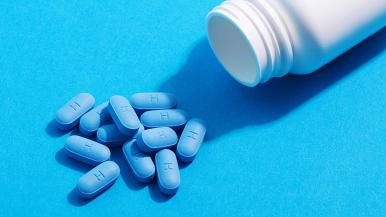Just a generation ago, millions of people infected with HIV faced the likelihood of eventually dying from AIDS. Then breakthrough treatments turned HIV infection into a largely treatable condition.
Now, some of the same medications used to treat the infection are helping to prevent it altogether.
People at risk for HIV can now choose to minimize their risk by taking a prescribed medication known as PrEP (pre-exposure prophylaxis). There are currently three approved drugs: Truvada, which was approved as a prescription drug in 2012, Descovy, which was approved in 2019 and Apretude, a long acting injectable drug which was approved in 2021. When taken consistently, these medications can dramatically reduce the odds of HIV infection.
We talked to Paola Susan, MD, a primary care physician at RUSH whose clinical expertise includes PrEP and LGBTQ+ health with emphasis on gender affirming care, as well as Neel Jhobalia, PharmD, a clinical pharmacy specialist with expertise on PrEP medications, to learn more about the drugs that offer hope in the fight against HIV.
1. PrEP is for people at high risk.
PrEP is for people who do not have HIV but are at high risk of getting HIV. “High risk patients include those who have anal or vaginal sex with multiple partners and don’t use condoms consistently, or people who have sex with a partner who has HIV,” Susan says.
It's also recommended for intravenous drug users who share needles. "Even though it is recommended to use clean needles, if there is any chance of IV drug users sharing needles, PrEP should be considered."
2. PrEP is not a substitute for safe sex.
Although PrEP reduces the risk of getting HIV from sex by more than 90% when taken regularly, people still need to practice safe sex by using condoms consistently.
For one thing, there's still a limited chance of acquiring HIV even while on PrEP. And the medications do not prevent other sexually transmitted diseases, such as hepatitis B, hepatitis C, human papillomavirus (HPV), gonorrhea and chlamydia.
"I talk to my patients about PrEP as a complement to condoms," Susan says. "PrEP certainly works, but it’s not a magic pill against all STIs. We need to make sure they can enjoy sex and also minimize as much as possible the risk of infections."
PrEP provides maximum protection from HIV after seven days of daily use for receptive anal sex. For receptive vaginal sex and risk due to sharing needles, PrEP is most effective after 21 days. “Taking it consistently is the key to success,” Susan says.
3. PrEP requires routine supervision by your doctor.
Before a doctor prescribes the medication, patients must take an HIV test to confirm they are HIV negative and have basic lab work to check kidney function.
Once on PrEP, you’ll need to see your doctor at least every three months for further monitoring if on Truvada and Descovey. Patients receiving Apretude — the newest PrEP option — begin the therapy with two initiation injections one month apart from a healthcare professional, followed by additional injections every two months. CDC guidelines recommend repeat HIV testing before each monitoring appointment. It is also recommended that patients be up to date with hepatitis B vaccination.
4. Insurance covers PrEP.
PrEP pills are covered by most insurance plans, including Medicaid, but because it's an expensive medication, some patients may encounter relatively high copays. Apretude is covered by many but not all insurance plans. Financial assistance may be available, though, through the drug manufacturers and patient advocacy organizations for all three options.
5. Side effects are usually manageable.
The most common side effects from the pill forms of PrEP include upset stomach, nausea, headache and loss of appetite, but most patients tolerate the medication well with side effects that are usually transient and improve within one to two weeks of taking the drug, Susan says. The most common side effect of Apretude is discomfort around the injection site.
As for long-term effects, the Centers for Disease Control and Prevention says no serious problems were detected in patients who have been on PrEP for up to five years.
6. Descovy, Truvada or Apretude?
In clinical trials, both Descovy and Truvada have proven to be equally effective at preventing HIV transmission. Truvada has been studied on a wider spectrum of patients, including gay and bisexual cisgender men, trans women, trans men, heterosexual, cisgender women and people who share needles.
There is not enough data to support use of Descovy among people who inject drugs or people at risk from getting HIV from vaginal sex, Susan says. But Descovy is preferred for patients who have kidney disease or osteoporosis because Truvada can cause kidney impairment and bone density loss, potentially worsening those existing conditions.
In clinical trials, Apretude was superior to Truvada in preventing new HIV infections in men who have sex with men and transgender or cisgender women. Apretude is a good option for those who have difficulty remembering to take their PrEP pills daily, prefer the discretion of injections compared to taking a pill — which could arouse suspicion from family or roommates — and who experience side effects from Truvada or Descovy.
Most insurance plans may require patients to try Truvada and/or Descovy first and provide documentation about side effects from either before approving Apretude, says Jhobalia. As a result, patients new to PrEP may not have much of a choice. A prior authorization will need to be submitted and approved by insurer in the vast majority of cases due to the cost of the drug. Generic Truvada is very affordable these days, and insurers will usually ask patients to try that first since the true cost of Apretude is around $4,500 per dose.
7. PrEP is not the same as PEP.
PrEP is for people who have not tested positive for HIV but who are at high risk. It is not recommended for people who may have been exposed to HIV in the last 72 hours.
PEP — or post-exposure prophylaxis — is used after possible exposure to HIV. This antiretroviral medication must be taken within 72 hours of possible exposure and continued for four weeks.
If you feel you’re at risk of contracting HIV, talk to your doctor about which PrEP is right for you. Regardless which one you take, it can significantly reduce your risk and put your mind at ease.



